|
|
|
Sort Order |
|
|
|
Items / Page
|
|
|
|
|
|
|
| Srl | Item |
| 1 |
ID:
118941
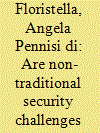

|
|
|
|
|
| Publication |
2013.
|
| Summary/Abstract |
How are regional organizations responding to the emergence of non-traditional security (NTS) challenges? Are they engaging in more cooperative efforts to meet new threats? Or, on the contrary, do they react in different manners according to their distinctive values, principles and internal structures? This article attempts to investigate how the threats posed by NTS are compelling different regional organizations to reconsider their security thinking and to find new innovative ways of cooperation. This is done by comparing two diverse regional organizations, the EU and the Association of Southeast Asian Nations (ASEAN), whose models of security cooperation have significantly varied reflecting the preference for different security approaches. The EU's security system has been more formalized and institutionalized; conversely, the "ASEAN way" has traditionally been rooted in the principles of informality and consensus. It is argued, however, that the emergence of NTS threats is acting as a catalyst behind a normative and operational shift of the modus operandi of both organizations. In so doing, this empirical analysis will try to shed light on the effects of exogenous factors on the emergence of patterns of convergence within the security sphere of distinctive regional processes.
|
|
|
|
|
|
|
|
|
|
|
|
|
|
|
|
| 2 |
ID:
191904
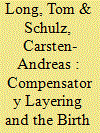

|
|
|
|
|
| Summary/Abstract |
International organizations come in many shapes and sizes. Within this institutional gamut, the multipurpose multilateral intergovernmental organization (MMIGO) plays a central role. This institutional form is often traced to the creation of the League of Nations, but in fact the first MMIGO emerged in the Western Hemisphere at the close of the nineteenth century. Originally modeled on a single-issue European public international union, the Commercial Bureau of the American Republics evolved into the multipurpose, multilateral Pan American Union (PAU). Contrary to prominent explanations of institutional genesis, the PAU's design did not result from functional needs nor from the blueprints of a hegemonic power. Advancing a recent synthesis between historical and rational institutionalism, we argue that the first MMIGO arose through a process of compensatory layering: a mechanism whereby a sequence of bargains over control and scope leads to gradual but transformative institutional change. We expect compensatory layering to occur when an organization is focal, power asymmetries among members of that organization are large, and preferences over institutional design diverge. Our empirical and theoretical contributions demonstrate the value a more global international relations (IR) perspective can bring to the study of institutional design. international relations (IR) scholars have long noted that international organizations provide smaller states with voice opportunities; our account suggests those spaces may be of smaller states’ own making.
|
|
|
|
|
|
|
|
|
|
|
|
|
|
|
|
| 3 |
ID:
127739
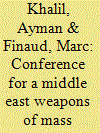

|
|
|
|
|
| Publication |
Geneva, Geneva Centre for Security Policy, 2012.
|
| Description |
132p.Pbk
|
| Contents |
GCSP Report
|
|
|
|
|
|
|
|
|
|
|
|
Copies: C:1/I:0,R:0,Q:0
Circulation
| Accession# | Call# | Current Location | Status | Policy | Location |
| 057577 | 358.30956/KHA 057577 | Main | On Shelf | General | |
|
|
|
|
| 4 |
ID:
152737
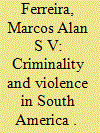

|
|
|
|
|
| Summary/Abstract |
This article aims to present the main challenges related to violence and crime in South America and to analyze how the Union of South American Nations (UNASUR) has responded. A content analysis of the official documents and minutes of three UNASUR councils is presented. The councils examined are the Defense Council, the World Drug Problem Council, and the Council on Citizen Security, Justice and Coordinated Action against Transnational Organized Crime. Notwithstanding its innovative bureaucratic structure, this research suggests that the structures of UNASUR have not kept pace with the growth of violence and crime.
|
|
|
|
|
|
|
|
|
|
|
|
|
|
|
|
| 5 |
ID:
182568
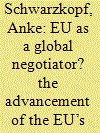

|
|
|
|
|
| Summary/Abstract |
This paper aims to account for the EU’s role in multilateral negotiations at the UNGA by looking at the negotiations on the enhanced observer status. During the negotiation process, the EU experienced significant opposition and had to accept an intermediate setback in form of a postponement of the vote. Despite this, the EU’s enhanced observer status was adopted by the UNGA in May 2011 as resolution 65/276. This research contributes to the understanding of the EU as an actor in multilateral negotiations and the interaction between state and non-state actors. I argue that the EU is in the process of establishing itself as an active and recognized actor at the UN and determining its role as a highly integrated regional organization and non-state entity in the state-centric environment of the UNGA. I analyse the negotiation process and the final agreement through the lenses of a bargaining approach and as an alternative, mutual recognition as global justice.
|
|
|
|
|
|
|
|
|
|
|
|
|
|
|
|
| 6 |
ID:
187042
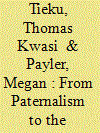

|
|
|
|
|
| Summary/Abstract |
This article explores the working relationship between the United Nations (UN), African Union (AU), and the Economic Community of West African States (ECOWAS) in mediating conflicts in West Africa and the Sahel regions. We argue that through the United Nations Office for West Africa and the Sahel (UNOWAS), the UN, ECOWAS and the AU are working on mediation efforts to transcend traditional conceptualizations of the relationship between the world body and regional organizations. We show that the partnership is grounded on the logic of subsidiarity, informality, elite networks, technical competence, soft skills, and robust social trust. For heuristic purposes, we call the six principles the Chambas Formula, with reference to the centrality of the Special Representative of the Secretary-General for West Africa and the Sahel, Mohamed Ibn Chambas, and the emergence and consistent application of the principles in the mediation setting in West Africa and the Sahel regions.
|
|
|
|
|
|
|
|
|
|
|
|
|
|
|
|
| 7 |
ID:
131100
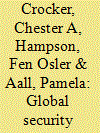

|
|
|
|
|
| Publication |
2014.
|
| Summary/Abstract |
At a time when the United Nations and key powerful states are pulling back from robust engagement in conflict management, regional organizations and ad hoc groupings of diverse organizations - collective conflict management initiatives - are stepping into the vacuum. In order to understand these two approaches - and why and when they may be operating together - this article compares them as they affect three significant questions and challenges in contemporary conflict management: is an intervention legitimate, is it effective, and does it set precedents for the community of states and international organizations that might be inclined to act. It notes that these approaches bring different strengths to an intervention process. Regional organizations play an increasingly critical role in providing legitimacy for an intervention, while the fact that collective conflict management initiatives do not set a precedent for further engagement allows them to act with more flexibility. The article concludes that neither of these approaches is sufficient to create a successor security regime to the post-cold war international system. It suggests that global power diffusion will be constrained by the irreplaceable core security competencies of powerful states acting bilaterally or, when it suits them, through regional bodies or the UN Security Council.
|
|
|
|
|
|
|
|
|
|
|
|
|
|
|
|
| 8 |
ID:
146265
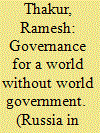

|
|
|
|
|
| Summary/Abstract |
There is no government for the world. Yet, on any given day, innumerable commercial, professional, diplomatic and personal cross-border activities take place in reasonable expectation of safety and security for the people, groups, firms and governments involved. Disruptions and threats are rare-indeed, in many instances rarer in the international domain than inside some countries. Thus international transactions are typically characterized by order, stability and predictability. This immediately raises a puzzle: how is the world governed even in the absence of a world government in order to produce norms, codes of conduct and regulatory, surveillance and compliance instruments? The answer is global governance whose content embraces the totality of laws, norms, policies and institutions that define, constitute and mediate relations between citizens, societies, markets and states in the international system.
|
|
|
|
|
|
|
|
|
|
|
|
|
|
|
|
| 9 |
ID:
113260
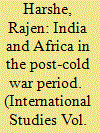

|
|
|
|
|
| Publication |
2010.
|
| Summary/Abstract |
This article presents an overview of Indo-African ties in the post-Cold War period in the context of the accelerated pace of globalization and economic reforms. It begins by taking cognizance of a few significant social realities in Africa such as the advent of democratic regimes in different African countries, the burgeoning of regional organizations as also the emergence of the African Union, the growing presence of India and China in Africa, etc. Subsequently, it analyzes the complexities of Indo-African ties in the realm of security, trade, business, investment and overall development cooperation and suggests the pathways that could refashion such ties under globalization.
|
|
|
|
|
|
|
|
|
|
|
|
|
|
|
|
| 10 |
ID:
123656
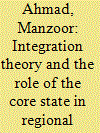

|
|
|
| 11 |
ID:
123141
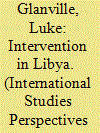

|
|
|
|
|
| Publication |
2013.
|
| Summary/Abstract |
The adoption of Resolution 1973 authorizing intervention in Libya represented the first time that the UN Security Council had authorized military intervention in a functioning and non-consenting sovereign state for the purpose of protecting civilians. A crucial factor prompting skeptical states to allow the passage of the resolution in the absence of sovereign consent was the fact that relevant regional organizations had consented to, indeed appealed for, such action. This article examines this possible shift away from reliance on sovereign consent and toward reliance on the consent of regional organizations in Security Council deliberations about the authorization of military intervention to protect civilians, and it considers what it might mean for the future of civilian protection.
|
|
|
|
|
|
|
|
|
|
|
|
|
|
|
|
| 12 |
ID:
133477
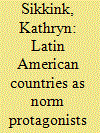

|
|
|
|
|
| Publication |
2014.
|
| Summary/Abstract |
Latin American governments, social movements, and regional organizations have made a far greater contribution to the idea and practice of international human rights than has previously been recognized. Most discussions of the global human rights regime stress its origins in the countries of the Global North. This article explores the role of Latin America states as early protagonists of the international protection of human rights, focusing in particular on the American Declaration of the Rights and Duties of Man. Histories of human rights in the world emphasize the Universal Declaration of Human Rights, passed by the UN General Assembly on 10 December 1948, as the founding moment of international human rights. Few know that Latin American states passed a similar American Declaration of the Rights and Duties of Man a full eight months before passage of the UDHR. The American Declaration thus was the first broad enumeration of rights adopted by an intergovernmental organization. This article explores the American Declaration as an example of often overlooked Latin American human rights protagonism that has continued to this day, and that calls into question the idea that human rights originated in only the Global North.
|
|
|
|
|
|
|
|
|
|
|
|
|
|
|
|
| 13 |
ID:
151528
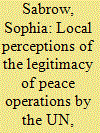

|
|
|
|
|
| Summary/Abstract |
This paper addresses two issues that have only been marginally discussed in the literature about peace operations: First, it investigates the legitimacy of peace operations from the perspective of populations of states that receive them. Secondly, it assesses how host populations perceive different types of peace interventions; by the UN, by a regional organization and by an individual state. A conceptual framework of the local legitimacy of peace operations is applied to an analysis of the perceptions of the French, ECOWAS and UN interventions in Mali in 2013–14. Local perception was measured by an analysis of Malian newspaper articles and interviews with (mainly southern) civil society actors. The results suggest that local actors negotiate between pragmatic and ideological conceptions of legitimacy. While French forces are pragmatically valued for their military achievements, they receive little ideological legitimacy. The regional force has high ideological legitimacy but disappoints in its performance on the ground. The UN force scores low in ideological legitimacy and is ambiguous in terms of pragmatic legitimacy.
|
|
|
|
|
|
|
|
|
|
|
|
|
|
|
|
| 14 |
ID:
165905
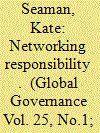

|
|
|
|
|
| Summary/Abstract |
The rapid rise of the Responsibility to Protect and its establishment within the global lexicon is nothing short of astounding. However, there are a number of questions that remain unanswered: Who has the Responsibility to Protect? Who are they protecting? What are the wider implications of this concept of responsibility? How is the concept being operationalized? Regional and subregional organizations are seen as key actors in the operationalization of the Responsibility to Protect, providing increased legitimacy and accountability. This article situates these organizations within a wider “network of responsibility” and examines the impact this engagement has on norm contestation, diffusion, development, and operationalization. The article highlights the potential that regional and subregional organizations have for acting as “linchpins” within a network of responsibility. It also demonstrates the challenges surrounding this role, and the wider implementation and operationalization of the concept.
|
|
|
|
|
|
|
|
|
|
|
|
|
|
|
|
| 15 |
ID:
119686
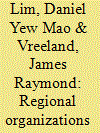

|
|
|
|
|
| Publication |
2013.
|
| Summary/Abstract |
Do regional hegemons use their power in regional organizations to advance foreign policy objectives? The authors investigate whether Japan leverages its privileged position at the Asian Development Bank (adb) to facilitate project loans for the elected Asian members of the United Nations Security Council (UNSC), a platform from which it seeks to shape global affairs. Analyzing panel data of adb loan disbursements to twenty-four developing member-countries from 1968 to 2009, the authors find that temporary UNSC membership increases adb loans, particularly during the post-1985 period, when Japan asserted greater influence in multilateral organizations. They estimate an average increase of over 30 percent. Because of Japan's checkered history of imperialism, the adb provides a convenient mechanism by which the government can obfuscate favors for politically important countries. Acting through this regional organization enables Japan to reconcile a low-key approach to foreign affairs with the contradictory goal of global activism-leading without appearing unilateralist.
|
|
|
|
|
|
|
|
|
|
|
|
|
|
|
|
| 16 |
ID:
173589
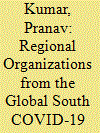

|
|
|
|
|
| Summary/Abstract |
The COVID-crisis has apparently halted the unsteadfast chariot of globalization and given a new lease of life to the Westphalian inter-state system, as the tendency of outward interaction has given way to more inward looking orientation, from global to national and from national to local. The nation-states have yet again emerged as the central actors in combating the novel coronavirus and mitigating various unfavorable repercussions emanating as a direct and indirect outcomes of the pandemic.
|
|
|
|
|
|
|
|
|
|
|
|
|
|
|
|
| 17 |
ID:
123174
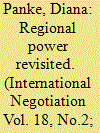

|
|
|
|
|
| Publication |
2013.
|
| Summary/Abstract |
Abstract The United Nations General Assembly is the International Organization (IO) with the broadest worldwide membership. While regional organizations are not members themselves, they can and often do become active through their own member states. This article addresses two questions: Do regional organizations differ in their ability to speak with one voice in IOs and, if so, why? Are some regional organizations more successful than others and, if so, why? Based on liberal theory and a mixed-methods approach, the research suggests, firstly, that regional organizations are in a better position to engage in collective action in IOs if they can develop group positions for a broad range of items. This is easier the greater the capacities and the stronger the incentives of the member states, the smaller the number of actors participating in regional organizations' coordination meetings, and the more homogenous groups are. Secondly, regional organizations are especially successful in IOs if they have common positions that their experienced and knowledgeable member states can push via argumentative strategies and if regional organizations can rely on the larger membership when it comes to playing two-level games in UNGA negotiations (tied-hands strategy) and when it comes to voting in IOs.
|
|
|
|
|
|
|
|
|
|
|
|
|
|
|
|
| 18 |
ID:
189882


|
|
|
|
|
| Summary/Abstract |
Over the past few decades, regions and regional institutions have gained increased attention in both scholarly literature and policy debates. A fundamental weakness in both debates, however, is the simplified focus on state actors and the official goals and policies of regional international organizations and inter-state frameworks. This article addresses this extant weakness by opening up for a more diverse empirical reality. By drawing on the new regionalism approach and two illustrative, comparative case studies from West Africa and East Africa, we offer new insights about how state and non-state actors interact in both formal and informal domains in order to produce variegated logics of regionalism that are poorly described by other theoretical perspectives. The article concludes by assessing the implications for theory and future research on regionalism in Africa and in other regions.
|
|
|
|
|
|
|
|
|
|
|
|
|
|
|
|
| 19 |
ID:
169076
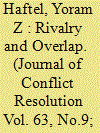

|
|
|
|
|
| Summary/Abstract |
The proliferation and scope expansion of regional organizations (ROs) is one of the most prominent features in contemporary international politics. In particular, many regional economic organizations (REOs) have expanded into the security realm. This trend has often resulted in an overlap with regional security organizations (RSOs) already in place. This study sheds light on this phenomenon by identifying the conditions under which REOs trespass into the security policy domain despite the fact that preexisting RSOs already fulfill security functions. We argue that the presence of strategic rivalries is an important driver of the creation and depth of organizational overlap through scope expansion. Specifically, RSOs that include significant interstate rivalries propel a subgroup of like-minded states to advance and deepen security cooperation through their existing REOs. Using an original data set of security cooperation within economic and security ROs and a quantitative analysis, we find substantial support for this argument.
|
|
|
|
|
|
|
|
|
|
|
|
|
|
|
|
| 20 |
ID:
118299
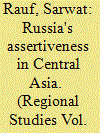

|
|
|
|
|
|
|
|